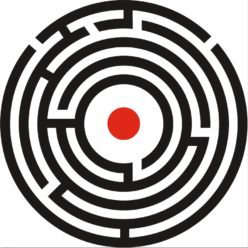“Tom, you’re on a roll with your career!” Thus reads the subject line of the latest email of the day.
This is fantastic news. Not “fantastic” in its common sense, but rather in its alternative sense of “fanciful; remote from reality.” After all, I am well into my fifth year of retirement, and it is at least three years since my last paper was published, my last patents granted, and my last appearance at a professional conference. While it would be nice to believe that the cumulative mass of my accomplishments has somehow reached a critical point, tipped, and is now barreling along on its own like an ever-growing cartoon snowball, it is not so.
My ‘fantastic’ career aside, I am curious about the truth value of the statement. Clearly it is not true – I am not ‘on a roll’ but in what way is it not true? One could simply say that it is a lie, but as the statement is no doubt generated by an algorithm, that seems both dubious and overwrought. A lie, I think, requires a degree of intention behind it, something I am loath to attribute to an algorithm. Of course, at some point a programmer constructed the phrase, and decided upon the conditions which would lead to its triggering. But I find it a little difficult to say that the programmer was lying.
Looking into it more deeply, the body of the email told me that I recently been appeared in 12 different searches. This might be nice if I were just starting out, and particularly if I was searching for a job, but as a person with over a 1,000 connections on Linked-In it is not especially notable – it is just an increase from the more usual 2 or 3 ‘notices’
Reflecting on the matter, there are a large class of algorithmically generated messages that seem similar. My favorite, a message which dates back to the ancient days of the digital age, is “Sorry. I don’t understand the word ‘Sorry.’ ” This seems to me to embody a deep truth.
Another example, which amuses me, is “Congratulations on your 462nd fastest run.” It is hard to imagine a world in which such an achievement would merit congratulations. I suppose if it were expressed as “Congratulations, your physical condition is not deteriorating as quickly as we would expect given the increase in your age,’ congratulations might not be completely unmerited. But, to be honest, I don’t think that’s it: I think the programmer never thought about the case where someone would be using their application for a half decade.
It seems to me that there is a sort of algorithmically generated fantasy world.
I don’t believe that that deserves congratulations; nor do I believe that such congratulations are sincere. When I was a child, in what they used to call grammar school, people believed I was a bit slow. What that means, at least in the context of a supportive environment, is that I received a lot of positive feedback for achievements that did not merit it. Although the subsequent discovery that I was myopic and simply needed glasses to address my academic malaise addressed this issue, it left behind an abiding distaste for compliments of any sort. Yet, curiously, the computer-generated flattery does not bother me.
Views: 4
